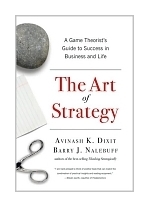|
||
• wydawnictwa polskie
• Zamów informacje o nowościach z wybranego tematu • kontakt
• Cookies na stronie |
THE ART STRATEGY A GAME THEORIST'S GUIDE TO SUCCESS IN BUSINESS ...DIXIT A. NALEBUFF B.wydawnictwo: NORTON , rok wydania 2010, wydanie Icena netto: Game theory means rigorous strategic thinking. It's the art of anticipating your opponent's next moves, knowing full well that your rival is trying to do the same thing to you. Though parts of game theory involve simple common sense, much is counterintuitive, and it can only be mastered by developing a new way of seeing the world. Using a diverse array of rich case studies—from pop culture, TV, movies, sports, politics, and history—the authors show how nearly every business and personal interaction has a game-theory component to it. Are the winners of reality-TV contests instinctive game theorists? Do big-time investors see things that most people miss? What do great poker players know that you don't? Mastering game theory will make you more successful in business and life, and this lively book is the key to that mastery. Table of Contents
512 pages, Paperback Księgarnia nie działa. Nie odpowiadamy na pytania i nie realizujemy zamówien. Do odwolania !. |


